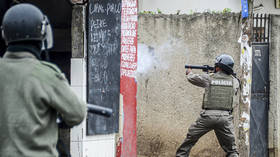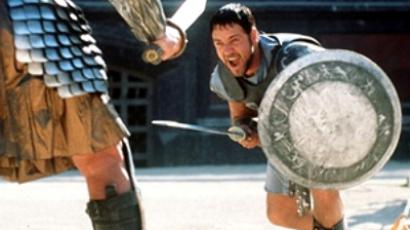Russia on standby as NATO goes global
NATO’s blueprint for change mentions cooperation with Russia as a new priority, but Moscow is pushing for more than just words.
Founded in 1948 as a military deterrent to the sprawling Soviet Union, 28-member NATO is increasingly forced to redefine its prerogatives beyond the narrow confines of an “Iron Curtain” mentality. But the organization’s search for relevancy 20 years after the collapse of its arch enemy is starting to violate Russia’s comfort zone.
Former US Secretary of State Madeleine Albright, who leads the “wise men” responsible for drafting NATO’s New Strategic Concept, stressed that "to safeguard security at home the alliance must continue to treat collective defense as its core purpose." Albright, however, added the loose disclaimer that “providing for security is a more complicated proposition than in the past.” This means that NATO – like some sort of transnational corporation that must forever increase in size in order to survive – will be forced to travel further afield in the future, as the challenges continue to mount and disperse.“NATO must be versatile and efficient enough to operate far from home,” she argued.“Alliance leaders should learn from its experiences in Afghanistan… the need to deploy forces at a strategic distance for an extended period of time. There should be no question that NATO's fundamental purpose is to protect the security of its members, but providing for security is a more complicated proposition than in the past.”Albright, in an effort to assuage Russian apprehensions over the Western organization’s policy shift, reiterated for the umpteenth time that the new concept was not “a threat to Russia.”“We do not see the gradual enlargement of NATO… as something that should be viewed as a threat to Russia,” she said, “and we all believe that and will continue to state it and the Russians in their own turn have to decide how they react."One between-the-lines interpretation of Albright’s comment could be that “NATO will act as it will, and Russia is free to respond however it feels necessary.” In other words: take our new global strategy or leave it; Moscow will just have to take Brussels on its word that the military bloc will never exist as a threat to Russia’s security.In May 2009, Russia released its own updated national security strategy, which specifically mentioned NATO as one of the country’s greatest threats.“The instability of the existing global and regional architecture, especially in the Euro-Atlantic region… is an increasing threat to the international security," the document said.Interestingly, especially in light of the ongoing battles being waged courtesy of US forces in oil-rich Middle East/Central Asian countries, the Russian paper mentioned “competition for resources” as a potential geopolitical flashpoint in the years to come.“In a competition for resources, problems that involve the use of military force cannot be ruled out, which would destroy the balance of forces close to the borders of the Russian Federation and her allies,” it said.But it is not simply a matter of NATO introducing weighty game pieces in Russia’s “near abroad” that is playing havoc with the Kremlin’s nerves; it is America’s unflinching determination to drop an antimissile system into Eastern Europe that is the primary source of US-Russian tensions today.
One man’s shield is another man’s sword
In February, Romania and Bulgaria announced they were in talks with US President Barack Obama's administration on deploying elements of the US missile shield on their territories from 2015.The move came after Obama shelved plans to deploy missile-defense elements in the Czech Republic and Poland due to “a reassessment of the threat from Iran.”Russia fiercely opposed the plan – both the original one hatched by the previous Bush administration, and the latest one by Obama – calling it a direct threat to its national security.According to the new NATO blueprint for change, Russia will figure into the new system. The question remains: How? As a mere occasional observer of the cool new technology, or a hands-on participant in the entire process? And if the latter, will they be involved from construction to activation?“Missile defense is most effective when it is a joint enterprise and cooperation … between the alliance and its partners – especially Russia – is highly desirable,” the NATO blueprint advised.“We are faced with a real threat and we need real protection against a real threat, and to that end we need an effective missile defence system which covers all populations in all allied nations,” Anders Fogh Rasmussen, Secretary General of North Atlantic Treaty Organization told reporters at a news conference.Meanwhile, Russian Deputy Prime Minister Sergei Ivanov told his own news conference on Tuesday that it will be clear by the end of the year exactly to what degree Russia will cooperate with NATO in the missile defense system, while stressing that the level of cooperation includes everything from “from A to Z.”“But cooperation needs to be from A to Z: to the end,” Ivanov said, adding, “We will assess the threats together, evaluate the risks together, and begin creating a defense system together.”Russian President Dmitry Medvedev said in an interview with the Danish Broadcasting Corporation (DR) in April that Moscow advises that “the system of global missile defense must protect not only a definite country or a group of countries, but also function in the interests of all responsible participants of the international society."Medvedev said Russia is opposed to the formation of air defense systems because they eventually “damage the current balanced system between the main nuclear powers.”“Either we are together or [Russia has] have to react somehow,” he said.NATO foreign ministers agreed at an informal meeting in Estonia in April that it was essential to begin dialogue with Russia on cooperation in the sphere of anti-missile defense.A new strategic concept should be drafted by the NATO Secretary General this summer on the basis of the report. The new strategic concept will then be approved by the NATO summit in Lisbon in November. On the basis of that summit we will finally have a peek at NATO’s hand. Will it be a bluff, or a sincere desire to reset relations with Moscow?
Give NATO-Russian cooperation a chance?
The document mentioned Russia’s decision to open an air corridor route over its territory to accommodate NATO military flights into Afghanistan, where 100,000 coalition troops are fighting a protracted war against Taliban forces. Incidentally, two-thirds of the soldiers fighting in Afghanistan are from the United States, and for Washington, the outcome of this war may very well spell make or break for NATO.Already this year, 200 NATO soldiers have been killed in Afghanistan, compared with 119 in the same period last year. Europe’s patience for such bloodshed will not last forever.In a recent article in the Financial Times, Richard Haas, the president of the Council of Foreign Relations, argued that NATO’s future role only makes sense “as an expeditionary force in an unstable world,” while predicting that the ties that bind Europe, NATO and the US together will eventually come undone.“European political culture has evolved in ways that make it harder to field militaries willing to bear the cost in blood,” Haas writes, before quoting Robert Gates, US Secretary of Defense, who complained about “the demilitarization of Europe – where large swaths of the general public and political class are averse to military force and the risks that go with it.”According to Haas, NATO “makes sense as an expeditionary force in an unstable world, not as a standing army on a stable continent.”As a result, “US-European ties and NATO were destined to become weaker given the end of the Cold War. Alliances tend to be created and to thrive in eras of predictability and consensus over threats and obligations. The post-Cold War, post-9/11 world is much more fluid than this.”Thus, Russia – due to its willingness to cooperate with NATO in Afghanistan, in addition to the fading away of the Cold War winds – is winning the trust of many of its erstwhile enemies and is seen as a trustworthy partner in the antimissile defense project.But there is another very compelling reason to give the green light for Russia’s participation in the controversial antimissile project: the system in its present state may simply not work.
"As easy as hitting a bullet with another bullet"
According to analysis being released by researchers at the Massachusetts Institute of Technology (MIT) and Cornell, the new weapons have fallen far short of their previously stated achievements.“Obama’s announcement of his new antimissile plan in September was based on the Pentagon’s assessment that the SM-3, or Standard Missile 3, had intercepted 84% of incoming targets in tests,” reported the New York Times on Monday. "But a re-examination of results from ten of those apparently successful tests by Theodore A. Postol and George N. Lewis, being published this month, finds only one or two successful intercepts."If the findings prove true, this would give the super-expensive, “state-of-the-art weapon,” designed to protect the European continent from a rogue attack, a dismal success rate of just 10-20%.Postol and Lewis say that any approaching warheads would be “knocked off course,” but not destroyed, which suggests that a nuclear warhead might still detonate in the vicinity of the target. So the issue, according to the researchers, is whether the SM-3 needs to strike and destroy the warhead of a missile – as the Pentagon claims it does.“The system is highly fragile and brittle and will intercept warheads only by accident, if ever,” said Dr. Postol, a former Pentagon adviser who criticized the performance of the Patriot antimissile system during the 1991 Persian Gulf War, as quoted by the Times.Meanwhile, Russia announced that it is ready to cooperate with the United States on a new European security treaty, Deputy Prime Minister Sergey Ivanov said on Monday.“Consolidation of European security serves the interests of both countries,” he said. “We are ready to cooperate with our American colleagues on the practical work of a new European security treaty.”Ivanov said the current state of European security “leaves much to be desired.”Russia published a draft European security treaty on November 29, 2009, but US Secretary of State Hillary Clinton politely rejected the proposal, saying a treaty is unnecessary.But the way the geopolitical (not to mention economic) winds are blowing on the European continent, it is too early to say if the Russian plan should be counted out just yet.Robert Bridge, RT













